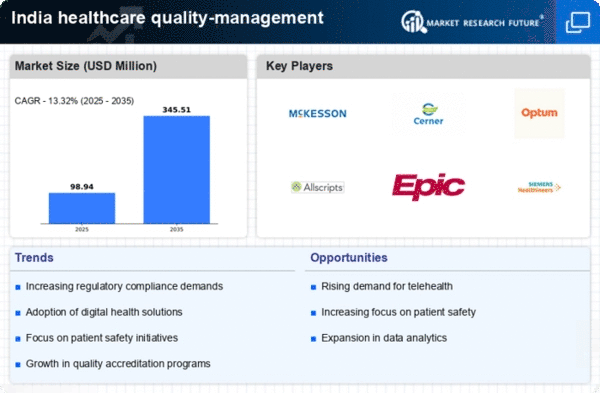Government Initiatives and Funding
Government initiatives aimed at improving healthcare quality are playing a crucial role in shaping the healthcare quality-management market in India. The Indian government has launched various programs to enhance healthcare infrastructure and promote quality standards across the sector. For example, the National Health Mission allocates substantial funding to support quality improvement initiatives in public healthcare facilities. This financial backing encourages hospitals to adopt quality management practices and comply with national standards. As a result, the healthcare quality-management market is likely to benefit from increased government support, which may lead to a more robust framework for quality assurance in healthcare services.
Technological Advancements in Healthcare
Technological advancements are significantly influencing the healthcare quality-management market in India. The integration of innovative technologies such as artificial intelligence, machine learning, and data analytics is transforming how healthcare providers manage quality. These technologies enable real-time monitoring of patient outcomes and streamline processes, which can lead to improved care delivery. For instance, hospitals that have adopted electronic health records (EHR) systems report a 30% reduction in medical errors, highlighting the potential of technology to enhance quality management. As healthcare facilities increasingly recognize the benefits of these advancements, investment in technology-driven quality management solutions is expected to rise, further propelling the market forward.
Increased Patient Awareness and Engagement
Increased patient awareness and engagement are pivotal factors influencing the healthcare quality-management market in India. Patients today are more informed about their rights and the quality of care they receive. This heightened awareness drives them to actively seek out healthcare providers that prioritize quality management. Surveys indicate that over 60% of patients consider quality indicators, such as accreditation status and patient satisfaction scores, when choosing a healthcare facility. As patients demand transparency and accountability, healthcare providers are likely to enhance their quality management practices to meet these expectations. This shift towards patient-centered care is expected to further stimulate growth in the healthcare quality-management market.
Rising Demand for Quality Healthcare Services
The healthcare quality-management market in India is experiencing a notable surge in demand for quality healthcare services. This trend is driven by an increasingly health-conscious population that prioritizes high standards of care. As patients become more informed about their healthcare options, they are more likely to seek out facilities that demonstrate a commitment to quality management practices. According to recent data, approximately 70% of patients in urban areas express a preference for hospitals that have established quality management systems. This growing expectation for quality is prompting healthcare providers to invest in quality management frameworks, thereby enhancing their operational efficiency and patient satisfaction. Consequently, the healthcare quality-management market is likely to expand as providers strive to meet these evolving consumer demands.
Growing Competition Among Healthcare Providers
The healthcare quality-management market in India is also being driven by the intensifying competition among healthcare providers. As the number of healthcare facilities increases, providers are compelled to differentiate themselves through quality management practices. This competitive landscape encourages hospitals to implement comprehensive quality management systems to attract and retain patients. Facilities that demonstrate superior quality metrics are more likely to gain a competitive edge, leading to increased patient volumes and revenue. Consequently, the emphasis on quality management is expected to grow, as providers strive to enhance their reputations and operational performance in a crowded market.
















